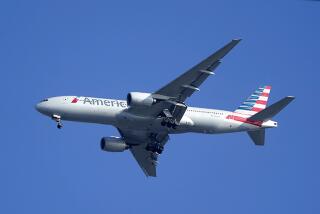Passengers hope for a bump -- in cash
- Share via
It’s called “involuntary denied boarding,” but in airline parlance, it’s “bumped” -- and that’s putting it mildly in a summer when flights are running fuller than ever.
The Department of Transportation feels your pain and wants feedback on new rules that could increase the compensation for airline passengers who are bumped.
The amount was last increased in 1978. For some perspective, consider that “Saturday Night Fever,” starring John Travolta as a svelte, disco-dancing man-about-town, was one of the top-grossing films that year.
Fast forward to 2007, when Travolta appears in “Hairspray” as a plus-sized middle-aged Baltimore housewife.
Denied boarding compensation may be due for change on a similar scale.
The department currently limits the amount of cash compensation for bumpees to the full price of their one-way fare up to $200 if their arrival is delayed less than two hours and up to $400 if the delay is more than two hours. (For international flights, the delay line of demarcation usually is four hours.) It is also proposing to apply the rules to planes with 30 or more passengers (versus 60 or more now).
The federal agency is considering five proposals:
* Increasing the $200 compensation limit to $624 and the $400 limit to $1,248 (tying it to increases in the Consumer Price Index).
* Increasing the compensation limits to $290 and $580.
* Doubling the compensation limits to $400 and $800.
* Eliminating all compensation limits and making compensation equal to the value of the tickets; the payment would double for longer delays.
* Keeping the current limits.
The issue is at the fore as the airlines struggle with their own success. This summer, planes are flying at record capacity, and the number of denied boardings is on the upswing. In the first quarter of this year, involuntary denied boardings increased 11% from last year.
For the airlines, it’s a sophisticated dance that involves analyzing historical data for flights and trying to project the number of passenger no-shows on each flight. Keeping seats full theoretically helps keep fares lower because once a flight has left the gate that seat cannot be sold. When the airlines get it wrong, they first ask for volunteers who are willing to give up their seats in exchange for vouchers for future travel.
Accepting vouchers comes with caveats.
“You’ve got to go into it with your eyes open,” says Terry Trippler, an airfare expert with TripplerTravel.com. Travelers need to ask whether the voucher is transferable or has an expiration. They need to know whether it’s like a gift certificate on which any money not spent can be applied to the next purchase. Is it good for any fare type, or are the lowest fares restricted?
Consumers have until Sept. 10 to file comments with the DOT (you can submit them online at dms.dot.gov, click the comments/submissions button at the top and enter docket OST-01-9325). More than 600 people have responded so far. Predictably, consumers favor increasing the compensation limits.
“People spend a lot of time planning their flight plans and connections, and it only takes the greed of the airlines to throw a wrench in one’s hard-made plans,” said James W. Huang of New York, who proposed $624 for delays of less than two hours and $1,248 for delays more than four hours plus the value of a full fare ticket plus 100%. Perhaps the best strategy is to avoid being bumped, which sounds impossible if it’s “involuntary.” But here are a few ways to decrease that likelihood:
* Fly an airline with fewer denied boardings. The Transportation Department issues regular reports on such “oversales” on its consumer information website (airconsumer.ost.dot.gov). In the first quarter of 2007, Delta had the worst record, with 3.47 denied boardings per 10,000 passengers; JetBlue had the best record, with 0.04. Of large carriers, United was best, with 0.40.
* Book well in advance, and select a seat when you book. “If you don’t have a seat assignment, you are more likely to be denied boarding than somebody who is assigned a seat,” says David Castleveter, spokesman for the Washington, D.C.-based Air Transport Assn., an airline industry trade group.
* Check in for your flight online before heading for the airport. Having your boarding pass makes it difficult for the airline to take your seat.
More to Read
Inside the business of entertainment
The Wide Shot brings you news, analysis and insights on everything from streaming wars to production — and what it all means for the future.
You may occasionally receive promotional content from the Los Angeles Times.









